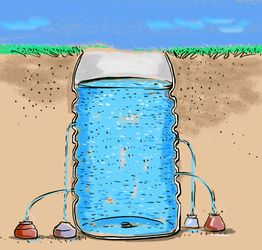The first order of the Cauvery Water Management Authority, quantifying the amount of water to be released by Karnataka to Tamil Nadu, virtually draws the curtains on one of the longest running river disputes in the country. Even though the Karnataka government has threatened to move the Supreme Court against the Central government’s terms for appointing the authority, which monitors and regulates the water releases, the critical issues thrown up have been sorted out after thousands of hours of hearing by the Cauvery Water Disputes Tribunal and the Supreme Court. The tribunal is being wound up by the water resources ministry.
The dispute had led to flared-up passions and unique forms of protests in both the riparian states (even though Kerala and Puducherry are also part of the dispute). If J. Jayalalithaa and M. Karunanidhi went on fasts, S.M. Krishna undertook a 130km journey on foot—all to press for riparian rights. The dispute, like the earlier disputes on sharing of the Yamuna-Sutlej, Krishna, Narmada and Godavari waters, drew the finest technical and legal minds in the country. Some lawyers even earned the soubriquet ‘water advocates’ for their mastery of water system information.
H.D. Deve Gowda, who comes from the riparian district of Hassan, made his first speech on the Cauvery dispute in Mysore state assembly in 1962, and has handled the subject as irrigation minister, chief minister and prime minister. The magnanimity he showed in secretly releasing water in 1995 impressed prime minister P.V. Narasimha Rao, who endorsed the Congress’s outside support for Gowda as prime minister a year later.
Chief Justice Dipak Misra was the one to end the prolonged legal agony by heading the bench which amended the Cauvery Tribunal order, making permanent allotments to states. Misra said that urban populations have a claim on river waters, apart from irrigation and power generation. Interestingly, Andhra Pradesh and Karnataka had earlier contributed a share of their water in the Krishna for the Telugu Ganga project, which supplies drinking water to Chennai. But now, drinking water has been made an essential, if not fundamental, right by the Supreme Court, so that people have a claim on all water resources.
Another dispute on drinking water has been festering between Karnataka and Goa. Karnataka wants to draw water from the Mahadayi (which becomes the Mandovi in Goa) for the drinking water supply in towns and villages in the northern part of the state. Goa, however, is not willing to give up its share. The BJP and the Congress, which are the main political parties in the two states, have obviously taken state-centric positions. A tribunal is now hearing the case.
Meanwhile, Narendra Modi and Water Resources Minister Nitin Gadkari have been pushing hard for interlinking of rivers.
Good rains in the Cauvery catchment area have made the first season of the year easy for the management authority. The challenge would come during the cycle of drought years and there would be agitations galore for and against release of water to Tamil Nadu from Karnataka reservoirs. Unlike earlier, where the Central Water Commission only monitored the flow of water at the interstate border, the water management authority has powers to check on water storage in the dams of both states, and moderate its orders depending on the availability. Anyway, both Tamil Nadu and Karnataka have decided to keep their big Cauvery dispute offices in Delhi to handle fights over the authority’s orders.
sachi@theweek.in


